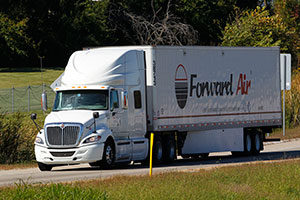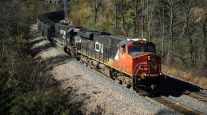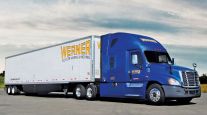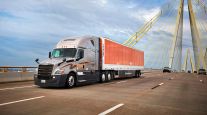Rate Gains Help Most TL Firms to Boost Second-Quarter Profits

Werner Enterprises Inc., No. 16 on the Transport Topics Top 100 list of U.S. and Canadian for-hire carriers, increased net income 24% to $31.8 million, or 44 cents per share, reporting a 3.8% increase in revenue per mile. Overall revenue fell 1% to $534.6 million.
A 6.7% rise in revenue per mile spurred No. 31 Knight Transportation Inc.’s 7% earnings growth to $27.6 million, or 33 cents. Overall revenue was up 14% to $301.8 million.
Covenant Transportation Group Inc., No. 46, nearly tripled net income to $11 million, or 60 cents, and achieved a 5% increase in revenue per mile. Overall revenue rose 11% to $175.5 million.
American Trucking Associations’ average revenue per mile index for the year to date stands at an all-time high of 158.4, Chief Economist Bob Costello told TT on July 23. ATA’s rates and the individual carriers’ pricing exclude fuel surcharge.
Knight CEO Dave Jackson on a conference call tied the rate levels to “a significant effort” by shippers to secure reliable truck capacity and avoid a repetition of last year’s demand spikes that led to shortages.
“We are making continued progress implementing sustainable rate increases,” Omaha, Nebraska-based Werner’s statement said. Higher rates are helping the company to offset rising costs linked to equipment, drivers and regulatory requirements.
Improved leasing, rental and supply chain profits helped Ryder System Inc. to raise second-quarter net income 13% to $85.4 million, or $1.60, to join other trucking industry companies with improving results. Total revenue declined 1% to $1.66 billion.
As TT went to press, No. 10 Landstar System Inc. said earnings rose 13% to $40.5 million, and No. 27 Universal Truckload Services Inc. announced profit fell 3% to $13.3 million.
Among the largest fleets, the only other decline was at No. 34 Forward Air Corp., where costs to integrate the acquisition of former rival Towne Air were blamed for 31% lower earnings of $11.8 million, or 38 cents.
On the revenue side, Forward Air led with a 29% increase to $249.7 million that was related to the acquisition.
The other truckload operators and Ryder reported that reduced fuel surcharge collections — resulting from lower diesel prices — depressed revenue.
In spite of the fuel surcharge factor, Phoenix-based Knight’s revenue increased to $301.8 million with help from its logistics business as well as a higher truck count.
Covenant’s revenue gain to $175.5 million was met by using more teams that produce higher revenue and adding equipment.
Second-half commentary generally was favorable.
Jackson said he expects second-quarter trends to continue in this quarter. In the fourth quarter, he said, freight demand could be less than last year, when demand was “acute.” He expects trucking demand will be tied to consumer demand levels in the period.
A report from William Blair analyst Nate Brochmann was more upbeat about second-half demand, even though investors remain cautious.
“We expect solid peak season demand as early talks with retailers indicate there could be a bump in activity,” Brochmann said.
“Discussions thus far with major peak season shippers make us optimistic regarding the demand for our service offerings for the remainder of this fiscal year,” Covenant CEO David Parker said.
The Chattanooga, Tennessee-based company’s second-quarter earnings benefited from a 12 cents per share insurance-related gain. In last year’s second quarter, Covenant earned $3.78 million, or 25 cents.
Knight’s results included one-time legal costs that shaved 6 cents per share from net income. Logistics unit results were helped by 64% more brokerage loads. In the 2014 quarter, Knight earned $25.8 million, or 31 cents.
Werner also reported higher earnings for its non-asset business in the second quarter. Its 2014 period earnings were $25.6 million, or 35 cents.
Year-earlier net income was $17.2 million, or 55 cents at Greeneville, Tennessee-based Forward Air.
CEO Bruce Campbell acknowledged that the company “underestimated the cost and time necessary” for the integration, while forecasting improvement.
“Over the course of the third quarter we will continue to right size headcount, evaluate non-core service offerings, drive improvements in productivity and rebalance the network,” he said.
Ryder added 6,000 lease vehicles and reported a 10% rental revenue increase. At Supply Chain Solutions, which ranks No. 13, new consumer and technology sector business helped boost profit before tax by 56%.
Net income in last year’s second quarter was $75.4 million, or $1.41.




